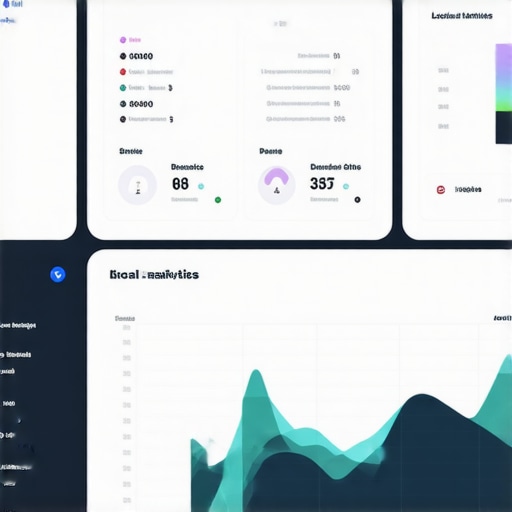Unlocking the Complexities of Google Maps SEO for Local Business Dominance
In the fiercely competitive landscape of local search, mastering Google Maps SEO has transitioned from a mere tactical maneuver to a strategic imperative for small and medium-sized enterprises aiming for visibility supremacy. As the 2025 digital ecosystem evolves, understanding the nuanced factors influencing Google Maps rankings is essential for marketers seeking to implement expert-level SEO tactics that deliver sustainable results.
Semantic Optimization and the Power of Contextual Relevance
At the core of advanced GMB (Google My Business) SEO lies semantic optimization, which emphasizes the importance of contextual relevance over keyword stuffing. Incorporating Latent Semantic Indexing (LSI) keywords naturally into your GMB profile, website content, and review responses ensures that your business resonates with the complex query intent of local consumers. For example, instead of generic phrases, integrating niche-specific terms like “eco-friendly landscaping services in Brooklyn” enhances topical authority and improves ranking signals.
Leveraging Local Citations and NAP Consistency for Authority Building
Expert practitioners recognize that citation accuracy and NAP (Name, Address, Phone Number) consistency across authoritative directories significantly influence local pack rankings. Advanced citation management tools, such as BrightLocal, facilitate the verification and synchronization of NAP data, ensuring your business maintains credibility within Google’s local algorithm. This consistency acts as a trust anchor, reinforcing your business’s relevance and authority in the local ecosystem.
Optimizing Google Business Profile for Engagement and Conversion
Beyond basic profile completion, strategic GMB optimization involves dynamic content updates, high-quality images, and review management. For instance, regularly posting updates about new services or promotions signals activity, which Google favors in ranking algorithms. Additionally, actively managing reviews by responding thoughtfully enhances your reputation and boosts local trustworthiness—key factors in Google’s ranking criteria.
How can small businesses leverage AI-driven insights to refine their local SEO strategies in 2025?
In the rapidly advancing landscape of local SEO, AI-powered analytics platforms offer granular insights into consumer behavior, search trends, and competitive gaps. These tools enable businesses to tailor their content, review strategies, and citation profiles with precision, thereby accelerating their Google Maps rankings. For an in-depth understanding, consult this comprehensive resource on local SEO innovation: Ultimate Guide to Google Maps SEO in 2025.
For ongoing mastery, consider exploring expert services that provide tailored citation and review strategies, such as GMB citation services. Engaging with industry thought leaders and participating in specialized forums can also enhance your strategic depth.
Interested in elevating your local SEO game? Dive into our detailed guides, share your insights, or connect with seasoned professionals to stay ahead in the competitive Google Maps landscape.
Harnessing the Power of Behavioral Analytics for Local Search Domination
As Google Maps SEO continues to evolve, understanding user behavior patterns becomes a game-changer. Behavioral analytics tools, such as heat maps and session recordings, allow local businesses to gain insights into how potential customers interact with their online profiles and physical locations. By analyzing these patterns, businesses can optimize their profile elements, service offerings, and even physical layout to better meet consumer expectations. This data-driven approach enables precision targeting, increases engagement, and ultimately boosts rankings in local search results. For a comprehensive approach, explore Ultimate Guide to Google Maps SEO in 2025.
Debunking Common Myths About Google My Business Optimization
One prevalent misconception is that simply claiming and verifying a GMB profile guarantees top rankings. In reality, ongoing optimization, including content updates, review management, and citation consistency, is vital. Another myth is that keyword stuffing can improve visibility; however, Google’s algorithms prioritize relevance and user experience. Overlooking these nuances can hinder local SEO efforts. To navigate these complexities, consider leveraging expert GMB optimization strategies that are rooted in current algorithmic realities.
What innovative tools or frameworks can small businesses deploy to stay ahead in the hyper-competitive local SEO landscape in 2025?
Emerging AI-powered platforms like BrightLocal and Local Falcon offer predictive analytics, citation management, and review monitoring, providing a competitive edge. Integrating these with traditional SEO tactics creates a holistic strategy that adapts to changing algorithms and consumer behaviors. For further insights, review the latest industry best practices at Advanced Local SEO Techniques.
Are you leveraging the full spectrum of available tools and frameworks? Sharing your experiences or seeking tailored advice can help refine your local SEO approach. Engage with our community, comment below, or explore more expert resources to enhance your local visibility.
Harnessing AI and Machine Learning for Hyper-Localized Search Precision
As the digital landscape becomes increasingly sophisticated, integrating AI-driven tools into your Google Maps SEO strategy offers unparalleled advantages. Machine learning algorithms analyze vast datasets — including user interaction patterns, search intent nuances, and geographical trends — to predict optimal ranking factors and recommend tailored optimization tactics. For instance, platforms like SEMrush’s Location Insights leverage AI to identify emerging local keywords and assess competitor gaps, enabling proactive content and profile adjustments that elevate your visibility.
Moreover, AI-powered review analysis tools such as ChatGPT-based sentiment analyzers can help craft personalized responses that resonate with your audience, fostering trust and loyalty. These tools decode nuanced sentiment cues, allowing businesses to address customer concerns more effectively and enhance their reputation signals, which are critical ranking factors in Google’s local algorithm.
What role does predictive analytics play in anticipating local search trends and adjusting strategies proactively?
Predictive analytics enables businesses to stay several steps ahead by forecasting shifts in consumer behavior and search patterns. By analyzing historical data, seasonal fluctuations, and emerging local interests, companies can optimize their content, promotions, and review solicitation efforts in advance. This agility not only improves rankings but also amplifies customer engagement. According to a report by Forrester Research (2024), businesses utilizing predictive analytics see an average increase of 25% in local search visibility within six months.
Innovative Local Link Building and Community Engagement for Authority Amplification
Beyond traditional citation and review management, advanced local SEO involves cultivating authoritative backlinks through community involvement and strategic partnerships. Building relationships with local influencers, sponsoring community events, or participating in regional forums not only enhances your local relevance but also earns high-quality backlinks that Google’s algorithm recognizes as signals of trustworthiness. For example, collaborating with regional chambers of commerce or industry-specific associations can generate valuable backlinks and increase your profile’s credibility.

Implementing structured outreach campaigns that leverage local storytelling, testimonials, and case studies can further strengthen your authority signals, making your business a recognized leader within your community. These efforts should be meticulously documented and integrated into your overall content strategy for maximum impact.
How can hyper-local content marketing boost your Google Maps rankings and community presence?
Creating hyper-local content tailored to specific neighborhoods, events, or community issues demonstrates your deep understanding of local needs. Such content not only attracts organic backlinks but also encourages user engagement and social sharing, which are indirect ranking factors. For instance, posting about local success stories or participating in neighborhood initiatives can foster goodwill and increase local search relevance.
Data-Driven Optimization: Tracking, Testing, and Refining Your Local SEO Tactics
To sustain a competitive edge, persistent monitoring and iterative testing of your Google Maps SEO efforts are crucial. Employing tools like Google Data Studio combined with local analytics platforms allows for real-time tracking of key metrics such as profile views, click-through rates, and conversion actions. A/B testing different profile elements — from service descriptions to photos and posts — reveals what resonates most with your local audience.
Furthermore, embracing a continuous improvement mindset, supported by insights from tools like Moz Local or Whitespark, ensures your NAP consistency, review management, and content strategies evolve in tandem with algorithm updates and local market dynamics.
What advanced methods can small businesses adopt to refine their local SEO efforts amidst evolving search algorithms?
Small businesses should adopt an integrated approach combining AI insights, community engagement, hyper-local content, and rigorous data analysis. Attending industry conferences, participating in local SEO webinars, and subscribing to authoritative newsletters like Search Engine Land’s Local SEO section are excellent ways to stay informed about emerging techniques and algorithm shifts. Additionally, leveraging local SEO audits periodically helps identify and address new issues proactively, maintaining optimal visibility.
For a comprehensive journey into mastering Google Maps SEO, explore our detailed guides, participate in expert forums, and consider consulting with local SEO specialists to customize strategies that yield sustainable results. The landscape is dynamic, and staying ahead requires both innovation and resilience.
Harnessing Multimodal Data for Next-Level Local Search Optimization
As Google’s algorithms evolve, the integration of multimodal data sources—combining textual, visual, and behavioral signals—becomes critical for sophisticated local SEO strategies. By leveraging tools that analyze user-generated images, voice search patterns, and real-time geospatial analytics, businesses can craft a holistic approach that aligns precisely with emerging ranking factors. For instance, integrating AI-driven image recognition with local content can enhance relevance signals, making your listings stand out in crowded markets.
What is the Impact of Zero-Click Searches on Local SEO Tactics?
Zero-click searches—where users find answers directly on the search results page—pose a significant challenge and opportunity for local businesses. To counteract this shift, optimizing for featured snippets, rich answers, and Google’s Knowledge Panel becomes essential. Advanced schema markup implementation, combined with structured data that highlights unique value propositions, can increase the likelihood of your business appearing in these coveted zero-click spaces, thereby maintaining visibility even when users don’t click through to your site.
External Authority and the Role of Niche Industry Endorsements in Local Rankings
Beyond traditional backlinks, acquiring endorsements from niche industry authorities and local influencers enhances your domain authority and local relevance. Participating actively in regional industry associations, contributing expert insights to local publications, or hosting community webinars can generate high-quality backlinks and social proof. These efforts reinforce your business’s credibility with Google’s algorithm, contributing to higher local pack rankings and improved brand trust.
How can hyper-personalization based on AI insights redefine your local marketing approach?
Implementing AI-driven hyper-personalization allows for tailored content, offers, and engagement strategies based on individual user preferences and behaviors. By analyzing data such as previous interactions, purchase history, and local event participation, businesses can deliver highly relevant messaging that fosters loyalty and increases conversion rates. This approach not only enhances customer experience but also signals to Google that your business provides valuable, contextually relevant content—crucial for climbing local search rankings. For authoritative insights, consult the latest research from Search Engine Land.
Ready to elevate your local SEO with cutting-edge techniques? Engage with industry experts, experiment with personalized campaigns, and stay informed on the latest innovations to outpace your competitors.
Leveraging AI-Powered Predictive Analytics for Strategic Advantage
Predictive analytics powered by machine learning models can forecast local search trends and consumer behaviors with remarkable accuracy. Incorporating these insights into your content calendar, review solicitation timing, and local advertising campaigns enables proactive optimization. For example, identifying seasonal spikes in demand or emerging neighborhood interests helps you allocate resources more effectively, ensuring your efforts are timely and relevant. As Forrester Research (2024) highlights, businesses utilizing predictive analytics experience a 25% increase in local search visibility within six months, underscoring its strategic importance.
Integrating Voice Search Optimization into Your Local SEO Framework
With the surge in voice-activated devices, optimizing for voice search becomes non-negotiable. Focus on conversational keywords, question-based queries, and natural language in your content. Additionally, ensuring your Google My Business profile is complete with accurate, up-to-date information facilitates voice assistants in delivering your business details accurately. Implementing structured data for Q&A sections and local FAQs further enhances voice search discoverability, making your business the go-to answer in your community.

Invest in comprehensive voice search strategies and monitor evolving user query patterns to stay ahead in the voice-first era of local SEO.
Conclusion: Embracing a Holistic, Data-Driven Local SEO Ecosystem
The future of Google Maps SEO resides in the seamless integration of multimodal data, predictive insights, authoritative endorsements, and hyper-personalized experiences. By adopting these advanced tactics, your business can not only improve rankings but also create meaningful connections within your community, fostering sustained growth and visibility. Continuous learning, experimentation, and engagement with industry thought leaders are essential to mastering this complex yet rewarding landscape.
Expert Insights & Advanced Considerations
1. Embrace Multimodal Data Integration
Leveraging textual, visual, and behavioral signals through AI-powered tools allows businesses to craft a holistic local SEO approach, enhancing relevance and visibility in Google Maps rankings.
2. Prioritize Hyper-Local Content Creation
Developing hyper-local content tailored to specific neighborhoods, events, or community issues fosters engagement, earns backlinks, and boosts local relevance, directly impacting your Google Maps prominence.
3. Utilize Predictive Analytics for Proactive Optimization
Forecast shifts in consumer behavior and search trends with AI-driven predictive analytics, enabling timely adjustments to your SEO strategies and maintaining a competitive edge in local search results.
4. Focus on Niche Industry Endorsements
Building relationships with local influencers and industry-specific authorities generates high-quality backlinks and social proof, strengthening your local authority and improving Google Maps ranking signals.
5. Integrate Voice Search Optimization
Optimize for conversational queries and ensure your Google Business Profile is complete with accurate data to increase visibility in voice-activated local searches, especially crucial in 2025’s voice-first landscape.
Curated Expert Resources
- Google’s Official Local SEO Guide: An authoritative source detailing best practices and algorithm updates essential for advanced optimization.
- BrightLocal Blog: Offers in-depth insights on local citation management, review strategies, and niche industry endorsements.
- Search Engine Land – Local SEO Section: Features expert articles on cutting-edge trends like multimodal data integration and predictive analytics.
- Moz Local SEO Resources: Provides comprehensive guides on hyper-local content, NAP consistency, and citation strategies.
- Forrester Research Reports: Offers strategic insights into predictive analytics and consumer behavior forecasting in local search.
Final Expert Perspective
Mastering Google Maps SEO for 2025 requires a sophisticated blend of multimodal data analysis, hyper-local content strategies, and predictive insights. By proactively integrating these advanced tactics, your business not only enhances visibility but also fosters deeper community engagement and loyalty. Dive into these resources, share your strategic insights, or collaborate with industry experts to stay at the forefront of local search innovation—your leadership in this space will define your competitive edge.





This post really hits the mark on how vital semantic optimization and the integration of AI tools are becoming for local SEO success. In my experience managing a small landscaping business, focusing on niche-specific keywords like ‘eco-friendly landscaping Brooklyn’ has noticeably improved our local ranking and helped us connect more authentically with our community. I’ve also started leveraging behavioral analytics to understand customer interactions better, which guides how I update our GMB profile and content. It’s fascinating to see how predictive analytics can forecast seasonal demand—last year, prepping ahead for spring boosted our visibility just as the season started. Has anyone else had success combining hyper-local content with AI-driven insights to enhance engagement? I’d love to hear how others are tailoring their strategies to stay ahead of the evolving algorithms.